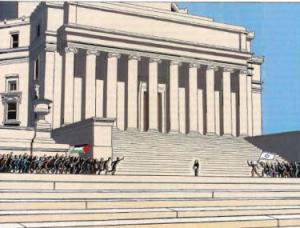Nadia Abu El-Haj
Nadia Abu El-Haj is an associate professor of Anthropology at Barnard College.
Contents
Barnard College Anthropology Department profile
"Prof. Abu El-Haj joined the Anthropology Department in fall, 2002. Previously, she held fellowships at Harvard University’s Academy for International and Area Studies, the University of Pennsylvania Mellon Program, and the Institute for Advanced Study at Princeton. She is, in addition, a former Fulbright Fellow and a recipient of awards from the SSRC-McArthur Grant in International Peace and Security, the Wenner-Gren Foundation for Anthropological Research, and the National Endowment for the Humanities among others. Professor Abu El-Haj has lectured widely at the New York Academy of Sciences, New York University, the University of Pennsylvania, the Institute of Advanced Study at Princeton, the University of Cambridge, the London School of Economics (LSE), and the School of Oriental and African Studies (SOAS) of the University of London. Prior to her arrival at Barnard College and Columbia University she served on the faculty of the Anthropology Department at the University of Chicago."
"Professor Abu El-Haj’s work examines the relationship between scientific knowledge and the making of social imaginations and political orders. Her first book examined the practice of archaeology—a historical science—and sought to specify the ways in which it generated facts and to understand how those facts circulated in wider social worlds, helping to fashion the cultural understandings, political possibilities and “common-sense” assumptions. Abu El-Haj’s more recent scholarship explores the field of genetic anthropology by analyzing, first, projects that seek to reconstruct the origins and migrations of specific populations and second, the participation of for-profit corporations that offer genetic ancestry testing. The intersection of race, diaspora, and kinship figures prominently in this study, where genetic origins emerge as a shared concern among those who may seek redress or recognition." [1]
Facts on the Ground controversy

In Fall 2001, Prof. El-Haj published Facts on the Ground: Archaeological Practice and Territorial Self-Fashioning in Israeli Society. It was published by University of Chicago Press.
In the book, Prof. El-Haj discusses the role of scientific knowledge in the Israeli-Palestinian debate. From the UChicago Press site:
"Archaeology in Israel is truly a national obsession, a practice through which national identity—and national rights—have long been asserted. But how and why did archaeology emerge as such a pervasive force there? How can the practices of archaeology help answer those questions? In this stirring book, Nadia Abu El-Haj addresses these questions and specifies for the first time the relationship between national ideology, colonial settlement, and the production of historical knowledge. She analyzes particular instances of history, artifacts, and landscapes in the making to show how archaeology helped not only to legitimize cultural and political visions but, far more powerfully, to reshape them. Moreover, she places Israeli archaeology in the context of the broader discipline to determine what unites the field across its disparate local traditions and locations."
Critics claim El-Haj undermines the Zionist movement by questioning the basis of a Israeli state before the modern-termed Palestinian people.
"Facts on the Ground is best understood as a post-modernist effort to deconstruct the existence of the ancient Hebrew kingdoms and nullify the connection between modern Jews and the ancient Hebrew people. Put simply, for Abu El Haj, if you can deny the ancient Jewish connection to the land of Israel, you can delegitimize the current Jewish presence there. This, and not truth and research, is her goal."
This quote comes from NadiaAbuElHaj.com, a website domain name taken by a group of concerned Barnard/Columbia alumni wishing to "deny tenure, and restore honor to Barnard, or to further the shame by supporting an ill-conceived and poorly researched decision, and thus lower the standards that have always been a trademark of our alma mater". [2]
More recently, a representative of the Teacher's College Jewish Association claimed that there is a link between El-Haj's work and anti-Semitic graffiti found on the Columbia campus.
Tenure
In November 2007, Nadia Abu El-Haj gained tenure status at Columbia University.
Bibliography
Articles
- American Ethnologist. Translating Truths: Nationalism, the Practice of Archaeology, and the Remaking of Past and Present in contemporary Jerusalem.
- Occasional Papers of the School of Social Sciences. A Tool to Recover Past Histories,” Genealogy and Identity after the Genome
- Israel Studies. Producing (Arti) Facts: Archaeology and Power During the British Mandate of Palestine.
- American Ethnologist. Edward Said and the political present.
- American Ethnologist. Overlooking Nazareth: The Ethnography of Exclusion in Galilee. Review by Nadia Abu El-Haj.
- Annual Review of Anthropology. The Genetic Reinscription of Race.
- American Ethnologist. After Jews and Arabs: Remaking Levantine Culture. Review by Nadia Abu El-Haj.
Thesis
- "Excavating the Land, Creating the Homeland: Archaeology, the State, and the Making of History in Modern Jewish Nationalism" (Duke University, PhD thesis, 1995).